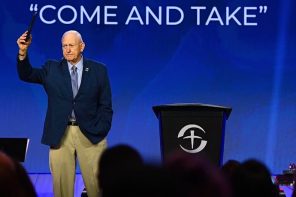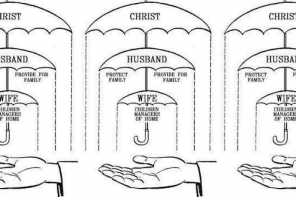Now that the sexual abuse allegations against Josh Duggar have resurfaced and made the news, many people are inquiring whether the Duggars’ belief system perpetuates sexual abuse. In light of other high-profile sexual abuse scandals among the Duggars’ associates—most notably Doug Phillips and Bill Gothard—it would be surprising if critics of Christian fundamentalism didn’t look for a theological smoking gun. But I actually want to urge some caution here.
Not “caution” understood as “calm.” Having a placid mood is not the same as telling the truth or understanding it, and sexual abuse of children is worth getting riled up about. Nor do I mean “Let’s be cautious” as code for “Maybe this isn’t an important question.” To the contrary, it’s a vital question. Yet it’s also an easy question to approach in an unhelpful way.
Precisely because sexual abuse is appallingly common, compassionate people look for patterns to explain why it happened in this instance and not that one. And that’s a good thing: abuse prevention means recognizing common patterns and then looking for interventions that are likely to keep abuse from happening. But our pattern-seeking human brains can also steer us wrong here, especially if we’re well-intentioned dabblers (as opposed to statisticians, criminal justice experts, or psychologists, or others who have been trained in methods that help one to recognize bias and account for it responsibly.)
One of my favorite informal fallacies to teach students is called the Texas Sharpshooter Fallacy. The story goes that a fellow shot a bunch of times at the side of an old barn, then painted bullseyes around each bullet hole and proclaimed himself a marksman. The marksman’s folly is easy to see in the story, but a bit more difficult to recognize in real life when we come across things that seem to happen more than chance should allow… such as high-profile sex abuse scandals involving leaders from the Quiverfull/fundamentalist subcultures. That can’t happen by chance, can it? It must be that the ideology and the subculture turn non-sex-abusers into sex abusers.
Well, I don’t know that we can say the last bit yet, for reasons I’ll explain in a minute. But meanwhile, let me risk stating the obvious and point out that there is plenty in Quiverfull Christianity just crying out for scrutiny and critique, including how it is able to handle sexual abuse. A repressive Christian subculture predictably will—and evidently did, in this case—enable abuse, making it harder for abuse to come to light and be dealt with appropriately.
Many of these factors have been explored by other commentators in depth, but briefly, they include things like: Brutal and unbending notions of authority; submission of women to men, and children to adults; a habit of intellectual dishonesty wherein those in authority won’t own up to the fact that they’re interpreting the Bible rather than just stating “what the Bible teaches us”; “counseling” programs that blame victims, and invite victims to blame themselves; a sense that the church is always qualified to handle its own business, thank you very much, and that public attention somehow damages “the cause of Christ”; and a coercive theology of forgiveness. All of these traits create conditions that abusers can exploit, and they all make it harder for victims to come forward and receive the support necessary to heal. This is not a theology designed to serve the interests of people whom abusers might target.
All of that is more than enough to warrant thorough, impassioned, principled critique. We won’t run out of work if all we ever do is expose those theological problems, and offer more honest and responsible theological possibilities.
But then there’s the question whether fundamentalist theology made an abuser where there was none before, whether it turned someone into a predator who would have been perfectly well-adjusted had they just been an Easter-and-Christmas Presbyterian and member of the Rotary club. And although I’ve seen friends and internet commenters saying as much… well, I just don’t think we can know that.
Remember, too, that even while progressives are looking at sex abuse scandals in conservative Christianity, men’s rights activists are finding patterns in something else: the high-profile news stories of female teachers who have sexually abused their underage male students. People who don’t like feminism—or who may simply harbor a distaste for women in general—look at those stories, see a pattern, and conclude that it’s the fault of the sexual revolution and women working outside the home.
So, too, with critics of the Human Rights Campaign, whose co-founder Terry Bean was arrested in 2014 on charges of sexually abusing a 15-year-old boy. In response, opponents of LGBT nondiscrimination ordinances have started referring to such ordinances as “Terry Bean Laws,” presumably because they see an ideological connection between LGBT equality and the sexual abuse of a child.
When is sex abuse a referendum on a worldview, and when is it not? I took some of these questions to my friend Chrysanthi Leon, Associate Professor of Sociology and Criminal Justice at the University of Delaware. Her research focuses on sex crime and how it is punished, and the public policy implications thereof. “[T]here are clearly structural factors that enable sexual abuse, including patriarchal power structures,” she said.
However, “sexual abuse is also so incredibly common but also so sensationalized that we will see it (or not see it ) however we are primed to, by our prior experiences.” Common is right: according to the Department of Justice, in the United States 1 in 6 boys and 1 in 4 girls are sexually abused before the age of eighteen, and about 18% of adult women have been raped. Social approval for aggression can help to explain why a particular person commits abuse, but there are other factors.
That’s why I’m hesitant to ascribe magical abuse-preventing power to having the right worldview (or avoiding the wrong one). To do so risks obscuring the fact that sexual abuse is far too common across all subcultures and belief systems. It’s appealing to think that all we need to do is get the right worldview and cultural norms sorted out, and then sexual abuse will cease. Unfortunately, it isn’t nearly that simple.





